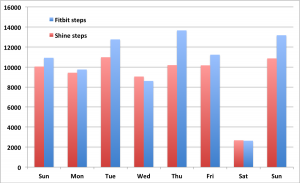Keep off the E. coli
It’s not that I deliberately set out to write about the Daily Mail stories in the Herald. I decide to write a post before I get to the source line at the end. It’s just that the really bad stories tend to be imports.
Today’s story starts
Your friend swears by the Atkins diet, your colleague loves Paleo and your neighbour is raving about gluten-free.
So which diet works? Perhaps all of them, according to new research which claims dieting is all in your genes.
In a recent study, scientists claim to have identified a collection of genes that allow humans to adapt to different diets.
Here we show that Caenorhabditis elegans lifespan is regulated by their adaptive capacity to different diets, which is controlled by alh-6, a conserved proline metabolism gene. alh-6 mutants age prematurely when fed an Escherichia coli OP50 but not HT115 diet.
That is, the research is in mutant nematodes. Not humans. Not mice. Not even fruit flies. The mutations completely disabled the gene. In humans that is extremely rare (though cases have been described). Even in mutant nematodes the dietary difference had nothing to do with weight loss, which is the most common reason for people to diet. And it wasn’t that different diets were better depending on the genetic variant, it was that the difference between a bad diet and a good diet was larger in nematodes with a broken version of this gene. And the bad diet was composed of E. coli bacteria, which don’t feature highly in Atkins, Paleo, or gluten-free. And.. just no.
It is interesting to see how the claims developed through the chain of citation. The abstract of the paper says
Collectively, our data reveal a homeostatic mechanism that animals employ to cope with potential dietary insults and uncover an example of lifespan regulation by dietary adaptation.
and the paper makes no claims about genetic sequencing or human diets.
The University of Southern California press release says
Your best friend swears by the Paleo Diet. Your boss loves Atkins. Your sister is gluten-free, and your roommate is an acolyte of Michael Pollan. So who’s right? Maybe they all are.
In new research published this month in Cell Metabolism, USC scientists Sean Curran and Shanshan Pang identify a collection of genes that allow an organism to adapt to different diets and show that without them, even minor tweaks to diet can cause premature aging and death.
Finding a genetic basis for an organism’s dietary needs suggests that different individuals may be genetically predisposed to thrive on different diets – and that now, in the age of commercial gene sequencing, people might be able to identify which diet would work best for them through a simple blood test.
introducing the trendy diets and the idea of gene sequencing to guide diets. This was also reprinted in shortened form at Science Daily.
The Daily Mail then reorganised the first paragraph, dropped Michael Pollan (whether because he’s less famous in the UK or because he’s more of a Guardian type) and introduced the assertion that the research found something about humans (rather than that it could be extrapolated to humans). And the Herald reprinted it.
If you want to know whether a particular reasonably sane diet will work for you, the best way is to try it. That was true in the past, it’s true now, and it’s going to be true for a long time, even with advances in genetics.
